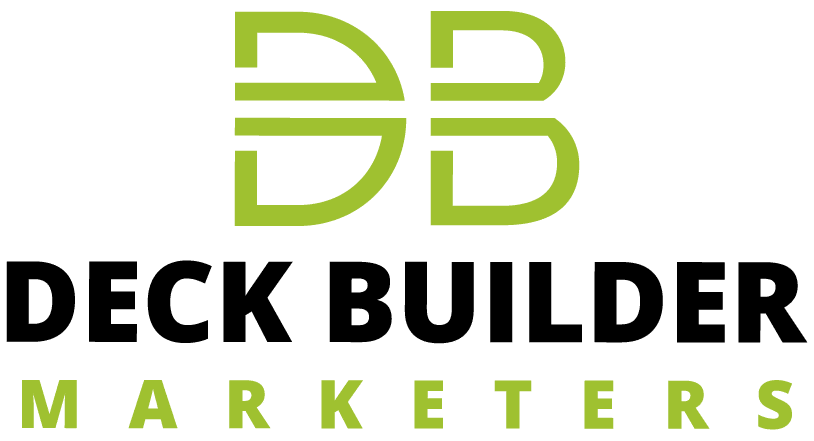
The Sales Funnel: The Matchmaker’s Playbook
What Is A Marketing And Sales Funnel?
As a deck builder, you have a desire to beautify homes in your service area. You got your website up, put in some standout photos of your work, and you wait for all the sales leads to hit your inbox from your website. And, you wait … and wait … and wait. Now, you are second-guessing yourself about why you even bothered with a website.
You have a website, great, but do you have a marketing and sales funnel?
What is that, you ask? Before I answer the question, let’s start by taking a look at what marketing is in general. Personally, here is how I explain marketing to others:
Marketing = Matchmaking
One of the most popular songs from Fiddler on the Roof contains these lyrics: “Matchmaker, matchmaker, make me a match; find me a find; catch me a catch.”
What do matchmakers do? They arrange a meeting between two people with the goal of seeing the couple get married (a long-term relationship).
Good matchmakers take the time to know you, understand your personality, figure out your strengths and weaknesses, and when they have a clearer picture of what you’re looking for, matchmakers (or, in our case, great marketers) help you:
- Find eligible partners (brand awareness)
- Present potential dates (lead generation)
- Prepare you to enter that long-term relationship — you know, how to look, what to say, etc. (lead nurturing)
How Does a Marketing Funnel for Deck Contractors Work? Marketing Funnels Explained
Whether you are a deck builder or any other small business, a marketing funnel guides, or “funnels,” potential leads to your company. The goal is to convert these leads into customers.
If you have ever used a funnel to guide oil into an engine, you know the funnel is wider at the top than at the bottom. With a sales and marketing funnel, you pour traffic into the top of the funnel and customers come out at the bottom.
And, yes, there will be more traffic at the top of the funnel than there are customers at the bottom. That’s a good thing. A properly set up sales funnel will help qualify leads that will aid conversions.
As with a lot of terms in marketing, you’ll see them used interchangeably. You might hear someone say “marketing funnel,” and another marketer call it a “sales funnel.” The names don’t stop there. Other terms include “marketing and sales funnel,” “digital marketing funnel,” and “purchase funnel.”
Confused yet? Don’t be. They all refer to the same concept: The customer journey, or how a lead becomes a customer.
As a deck contractor, you’ll want to proactively align your marketing strategies with your customer’s journey (this will help you avoid digital marketing pitfalls). When you do, your deck building business will generate superior brand awareness, greater sales, and stronger loyalty.
The AIDA Marketing Funnel Stages
One of the tried-and-true ways of persuasion, and what is sales if not persuasion, is the AIDA formula. Brands, copywriters, and speechwriters have all used this framework to grab Attention, create Interest, and drive Desire, all with the aim of leading to Action.
Turns out, the AIDA formula works for marketing funnels, too. The framework relates to different parts of the funnel:
- A = Attention (Top of the Funnel / TOFU)
- I = Interest (Middle of the Funnel / MOFU)
- D = Desire (Middle of the Funnel / MOFU)
- A = Action (Bottom of the Funnel / BOFU)
- BONUS: Loyalty (not part of sales & marketing, but important!)
When you look at the sales funnel graphic, it can seem overwhelming. However, focus on the basic principles down and start to imagine how they will help your deck building business. Once you do that, it will make all your marketing tactics and strategies much easier to understand. When you can see the grand picture, it will just click when you see how each initiative supports another to move a lead closer to a customer!
The fact is, I sometimes get bogged down with all of these marketing terms, and I do this stuff every day! The point is to have a foundational framework from which to operate. I never did like starting a painting with a blank canvas, and some of those paint-by-number pictures look pretty sweet when done.
Traditional Marketing and Sales Funnel
When you look at the more traditional marketing funnel [from back in the day], the upper region of the sales funnel was primarily where marketing occurred. The leads generated from the first two stages got handed to sales. Needless to say, more work shifted to the sales team. Unfortunately, this led lower sales conversion rates, which seems counterintuitive.
There arose the issue of what I call “The Battle of the Faults.” It goes something like this:
Sales rep:
“It’s marketing’s fault because the leads aren’t qualified. I’m sick of trying to close bad leads.
Marketing team:
“It’s sale’s fault because they can’t close the leads we give them.
Who wants or needs that kind of division and tension? It’s inefficient, unsatisfying and there is a better way!
Enter: The Modern Marketing and Sales Funnel
These days, the marketing team (whether internal or external) needs to work much harder to set up the sales team for success. This becomes particularly true when talking about digital marketing.
Digital marketing done right should provide you with a higher return on investment. Instead of a salesperson (and a costly salary) doing all the work, carefully crafted content for your website and thoughtfully planned out advertising campaigns targeting the right audience can benefit your sales team greatly.
Imagine how your deck building business would benefit when the website contains optimized content focused on the right keywords that make it easier for people Googling “deck builders near me” to find you. Consider a digital advertising campaign that will work for you 24/7 at a fraction of the cost.
Before I started my business, I worked several years as an in-house marketer. I made it my mission to work very closely with our sales team to make sure my marketing efforts helped them be more successful.
I asked the sales team to answer these questions:
- What are the unique problems customers are looking to solve?
- What keeps them up at night?
- How does the company solve these problems better than anyone else?
- And, what are the customers’ main sales objections?
This kind of knowledge only comes by regularly speaking with the sales to understand what challenges, obstacles, and successes they are experiencing. Internal communication and collaboration becomes an integral part of converting leads into customers. Marketing should not be living on an island somewhere!
When you gather all these insights from the sales staff, now you are ready to create content and advertising campaigns that address those issues your team faces.
With the internet, search engines, online reviews, and social media, consumers today have a vast amount of intel on companies, services, and products. Consequently, they are in charge. Whether it’s a focus group, a survey, or their behavior, the message is loud and clear: They don’t want to be sold to.
This is why deck builders and other small businesses need a strong digital footprint.
Customers will do their own research with the phone they pull out of their pockets. They will search the internet, look at Google My Business entries, look at Google reviews, Facebook reviews, and other sites to gain as much intelligence as possible.
Then, and only then, when they are equipped with the sufficient knowledge, they will hop on the phone call or fill out a contact form on a website.
Your content and advertising messaging should equip consumers with everything they need to feel empowered, comfortable and ready to make an informed decision that your company can and will solve their decking situation.
TIP #1: A great content strategy is closer to a Q&A: You research which questions your customers are asking and then answer them in detail, thus building trust and bringing customers closer to your brand.
TIP #2: The better you understand your customers’ needs AND the journey they take to becoming a customer, the better your funnel will perform. You can address objections and sticking points along the way.
Marketing Strategy Before Marketing Tactics
Unfortunately, a common mistake I’ve seen with small business owners is they dive straight into marketing tactics before ever considering the proper foundation of a marketing strategy. You would never arrive on a site and just start building a deck without a plan or preparing the ground.
Think of your marketing strategy as the plan and preparation needed before you can start building that deck. Without a plan, you would never know how much lumber and supplies you needed. If you don’t prepare the site, then it will only cause problems as you get further along in the deck-building process.
So, before jumping straight into the sales & marketing funnel, take the time to map out your strategy — just like you do with every deck project.
If you want the matchmaker to find you a find and catch you a catch, then let’s look at the steps involved:
STEP 1: Identify the right person = STRATEGY: Define your target audience
- Goal: Clearly define who your target audience is (think about your dream spouse)
- Tactics: Brand Strategy, Interviews, Personas, Customer-Journey Mapping
If you skip this step, you might wind up with a bunch of dates who are just not your type. This wastes your time and their time. And guess what? When this happens, nobody’s happy.
So, spend the time to understand your compatibility criteria first.
Now let’s look at each of the sales funnel stages of the AIDA Funnel in more detail. For each stage, I will break it down and look at these elements:
- Overview
- Goals
- Tactics
- Measurement (that which does not get measured does not get managed)
- Content ideas
Top / Upper Funnel Marketing Stages
As Lewis Carroll wrote: Begin at the beginning. Everything starts at the top of the funnel. This is the stage where you get more fish into the pond. Much of what you do in terms of marketing will happen here. The goal is to cast a wide net, and only later start to add some refinements.
STEP 2: Attract the right person = ATTENTION (Awareness)
- Goal: You want to make it easier for potential customers to become aware of your brand and visit your website (Attract your perfect match)
- Tactics: SEO, Networking, Social Media, PPC, Facebook Ads, Blog Articles, Infographics, Video
- Measurement: Attribution, Engagement, Traffic
- Content: The job of content in the awareness stage is to introduce people to your brand (generate awareness) by creating searchable (SEO-based) and shareable (on social media platforms) content to discover you. The kind of content that works best are broader topics where people are searching for their problems in general.
STEP 3: Make a good first impression = INTEREST
- Goal: Instill trust (Impression/ How you make them feel/ Have a conversation)
- Tactics: Website Design/User Experience, Content
- Measurement: Bounce rate, Time on site (two important data points that signal user behavior on your site)
- Content: Your website content must address the needs of your target audience. Think about it this way: If you continually call your date by the wrong name, the relationship will end quickly. The content, also known as your messaging, should reflect your personality and make people intuitively feel they have found the right place. So, make a great first impression, make your visitors feel comfortable and connected, and overall they will have a great experience. It will go a long way toward building goodwill.
Middle Funnel
When you get to the middle of the funnel, marketing and sales begin to come together. Earlier we talked about casting a wide net and refining later. Now is the time to refine and qualify leads. This is the process where you prepare them to talk to sales. This helps reduce the time it requires your sales rep to close leads!
STEP 4: Make a move – DESIRE
- Goal: Convert website traffic into leads (we call this lead conversion/Ask out on a date)
- Tactics: Lead Gen Offers (Whitepaper, Webinars, Tools), Email Marketing & Automation, Demos, Free Trials
- Measurement: Conversion Rate, Number of Conversions
- Content: At this point, people are cognizant of your brand, but it doesn’t mean they completed all of their research. The content you create for the middle of your marketing and sales funnel should be geared toward converting visitors on your site into leads. The next step is to build trust with those leads, and they will eventually become your customers.
Lower Funnel
We have finally reached the bottom of the funnel. This is the place where conversions happen and purchases are made. This lower section of the funnel is where you convert qualified prospects into your customers)!
It is at this stage where you want to pay the most attention. What you do at this point in the funnel has to be done properly. Why? If you don’t get this right, then none of your other efforts will matter much.
As people move through the funnel, they become more interested in purchasing your product or service. As your potential customers see your past deck projects, you hope they will see them all over the internet (Google My Business, search engines, and social media). As they encounter your brand online, they will begin to trust your craftsmanship, and they will naturally become more interested in having your build their dream deck.
TIP #3: If you haven’t approached your business by identifying “leaks” in your marketing & sales funnel like this before, then always start in the lower funnel first.
STEP 5: How to make a move – Action/Purchase
- Goal: Convert leads into customers (Lead conversion/ Propose for marriage)
- Tactics: Case Studies, Webinars, Sales process: Consultation, quote, proposal, etc.
- Measurement: Sales
- Content: People at the bottom of your funnel are the ones most likely ready to take the next step. However, they might require that extra push to instill the confidence in them needed to make a decision to work with you. While the leads you find in the lower section of your funnel are interested in the services you provide, they are still weighing in their minds whether you are worth the investment.
I want to address another stage, but it is not part of the sales and marketing funnel proper. After all, you have made the sale and closed the deal. However, you want to deliver a world-class experience to keep customers coming back or they refer more customers to you because they were so pleased with the entire process.
STEP 6: How to make a move – LOYALTY
- Goal: Repeat sales & referrals (Long-term customer & brand ambassador/ Happy wife, happy life!)
- Tactics: Create a world-class delivery, Customer Thank You’s, VIP / Loyalty Programs, Upsells, Events, Rewards, Community Building
- Measurement: CLV, Referrals, Net Promoter Score/Reviews
In Summary
When you started your own deck-building business, you probably did so because people said you had a real knack for constructing them. But, eventually you realized marketing your business demanded your attention.
The sales and marketing funnel might seem like information overload, but let it serve as a framework to spur you on to thinking in a more strategic fashion and help you realize marketing is an important investment (not to mention a tax deduction). Always be proactive in your approach. The number of fish in your pond might be increasing via referrals, which is great! But, if you want a steady stream of QUALITY leads coming your way, then make sure you feed the funnel (TOFU).
If you want to spend less time on tire kickers and more time connecting with prospects that you truly want to work with, then proactively warm them up before wasting your time (MOFU).
And remember, nobody wants to be sold to. If you are struggling to close the deal, use BOFU tactics to help. Make sure your sales process is easy for your customers and ALWAYS BE HELPFUL.
Next steps
Does your deck contracting business need help understanding or creating a sales funnel? Schedule a complimentary, Custom Marketing Plan today.







